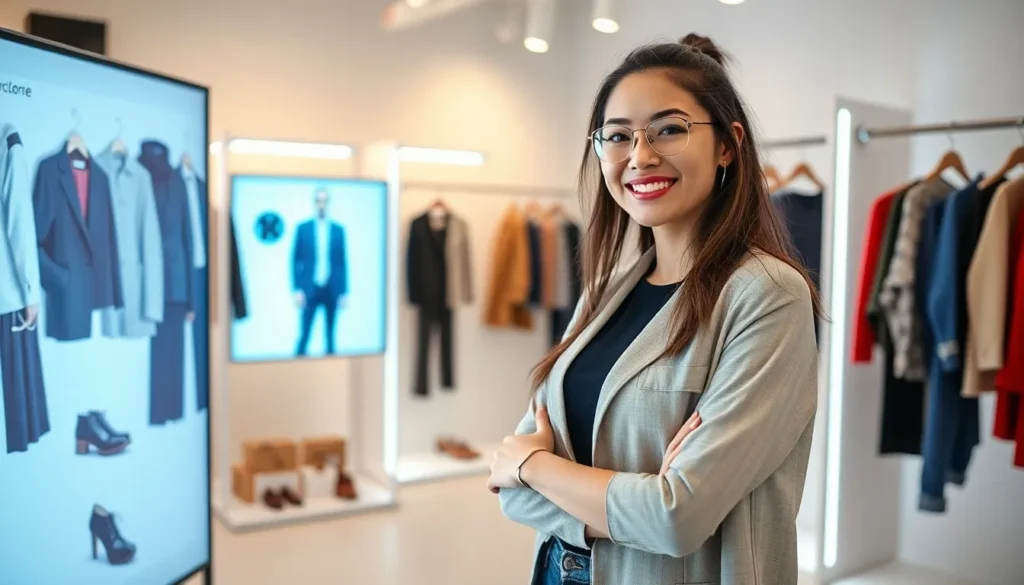Table of Contents
ToggleIn a world where fashion meets technology, the runway is no longer just about fabric and flair. It’s about algorithms and innovation. Fashion tech startups are strutting onto the scene, blending style with cutting-edge tech to create products that not only look good but also make life easier. Imagine a wardrobe that suggests outfits based on the weather or smart fabrics that adapt to your body temperature.
Overview of Fashion Tech Startups
Fashion tech startups represent a dynamic segment that fuses technology with fashion. Startups in this space leverage cutting-edge algorithms to create personalized shopping experiences. Some companies develop applications that analyze user preferences, offering tailored recommendations to streamline outfit selection.
Innovators tackle problems such as sustainability and inventory management by integrating smart solutions. Brands utilize data analytics to predict trends, helping retailers stock popular items, reducing waste. Numerous startups focus on wearable technology as well, creating items that enhance user comfort while providing functionalities, such as health tracking.
Additionally, virtual fitting rooms are gaining traction among online retailers. This technology allows customers to visualize clothing on their bodies before purchasing, reducing return rates. Alongside this, augmented reality experiences are transforming the way consumers interact with fashion items, bridging the gap between physical and digital shopping.
Fashion tech startups such as Rent the Runway and Stitch Fix exemplify successful models in this sector. These startups have disrupted traditional retail methods by incorporating data-driven approaches to meet customer demands. Companies continue to push creative boundaries, exploring intersections between 3D printing and fashion design, which enables on-demand production of unique apparel.
Insight into consumer behavior shapes the future of retail strategies. Through AI technology, companies refine marketing efforts, targeting specific demographics effectively. As competition increases, ongoing innovation remains essential for fashion tech startups to thrive in an evolving landscape.
Key Players in the Fashion Tech Industry

The fashion tech industry hosts a variety of influential companies and innovative newcomers. These players help shape the landscape of fashion technology, driving both change and growth.
Established Companies
Established companies dominate the fashion tech space. Companies like Amazon Fashion and Zalando leverage vast data resources to enhance consumer experiences. Their platforms utilize advanced algorithms for personalized recommendations. Retailers such as Nike and Adidas are incorporating wearables into their product lines, promoting smart clothing that tracks performance metrics. These larger companies frequently invest in tech initiatives, ensuring seamless e-commerce experiences. Brands with a history of sustainability, like Patagonia, enhance their eco-friendly practices using technology. Overall, established companies pave the way, merging traditional fashion with tech innovation.
Emerging Startups
Emerging startups spark excitement within the fashion tech arena. Startups such as Stitch Fix and Rent the Runway provide unique solutions for personalized shopping. They generate curated selections based on user preferences and past purchases. New entrants like MeUndies revolutionize customer engagement by prioritizing comfort and sustainability in their designs. Others, such as Unfold, focus on augmented reality for virtual try-ons, allowing consumers to visualize outfits. Meanwhile, platforms like ThredUP advocate for sustainable shopping through resale models. These startups challenge conventional retail methods, proving that innovation is vital for success in a rapidly changing industry.
Innovative Technologies in Fashion
Fashion tech startups continually introduce innovative technologies that redefine consumer experiences and industry standards. These advancements prioritize style and functionality while addressing sustainability and personalization.
Wearable Technology
Wearable technology shapes the fashion landscape by integrating smart features into clothing and accessories. Devices track health metrics, monitor fitness, and enhance lifestyle convenience. For instance, smartwatches provide notifications and fitness tracking, allowing users to maintain connectivity without sacrificing style. Companies like Nike and Adidas embed technology directly into their products, raising the bar for performance apparel. Moreover, enhanced materials adapt to body temperature, offering comfort in various conditions. The fusion of technology and fashion transforms everyday wear into multifunctional pieces.
Sustainable Fashion Solutions
Sustainable fashion solutions address environmental challenges by minimizing waste and promoting eco-friendly practices. Startups leverage data analytics to predict trends accurately, enabling brands to produce only what’s necessary. Examples include platforms like ThredUP, which facilitate resale shopping to extend the lifecycle of garments. Innovative materials, such as recycled fabrics, contribute to sustainability while maintaining aesthetic appeal. Brands like Patagonia demonstrate commitment to ethical practices by integrating technology in their supply chains. Reducing the carbon footprint of the fashion industry becomes achievable through these innovations, ensuring a greener future for fashion.
Investment Trends in Fashion Tech Startups
Investment trends reflect a growing interest in fashion tech startups, as emerging technologies reshape the industry. Investors increasingly recognize the potential for innovations that enhance consumer experiences and promote sustainability.
Venture Capital Involvement
Venture capital plays a crucial role in fashion tech, fueling startups with necessary funding. In recent years, investments surged, reaching over $1 billion in 2022. Backers seek companies that leverage data for personalized shopping experiences and utilize emerging technologies. Notable brands like Stitch Fix and Rent the Runway attracted significant venture capital, highlighting investor confidence in data-driven models. Consequently, a focus on sustainability and ethical practices increasingly draws capital, as consumers demand accountability from brands.
Crowdfunding Platforms
Crowdfunding platforms emerge as accessible alternatives for fashion tech startups seeking to raise funds. Through platforms like Kickstarter and Indiegogo, companies often connect directly with consumers, fostering community support. Not only do these platforms democratize funding, they also validate business ideas in real-time. Many startups use these channels to showcase innovations, from sustainable fabrics to smart wearables. Successful campaigns frequently demonstrate unique value propositions, attracting attention and investment opportunity. This trend underscores the growing consumer interest in fashion tech, encouraging entrepreneurs to pursue creative ventures.
Challenges Faced by Fashion Tech Startups
Fashion tech startups encounter several challenges in a competitive landscape. Navigating this rapidly evolving market demands innovation and adaptability.
Market Competition
Competition in the fashion tech sector is intense. Numerous startups strive to capture consumer attention alongside established companies like Amazon Fashion and Nike. New entrants often struggle to differentiate their offerings from existing products. Additionally, the rapid pace of technological advancements complicates matters further. Constantly evolving consumer preferences create a challenging environment. Startups must implement creative marketing strategies to attract and retain customers. Adapting to market trends and consumer demands plays a vital role in their survival.
Technological Barriers
Technological barriers pose significant obstacles for fashion tech startups. Implementing new technologies often requires substantial investments in research and development. Startups might lack access to the expertise necessary for integrating complex systems, resulting in slower growth. Data privacy concerns also affect the adoption of innovative solutions. Balancing personalization with user security becomes crucial for these companies. Moreover, high development costs can limit the ability to experiment with emerging technologies. Limited resources hinder their capacity to scale effectively in a competitive space.
Fashion tech startups are at the forefront of a transformative era in the industry. By merging technology with style they’re not only enhancing consumer experiences but also addressing critical issues like sustainability. The innovative solutions these startups offer—from personalized shopping to wearable technology—showcase their potential to reshape how consumers interact with fashion.
As investment in this sector grows the landscape will continue to evolve. Startups must remain agile and creative to thrive amid intense competition and technological challenges. With ongoing advancements and a commitment to ethical practices the future of fashion tech holds exciting possibilities for both consumers and entrepreneurs alike.







